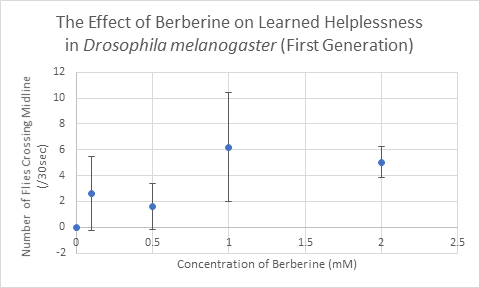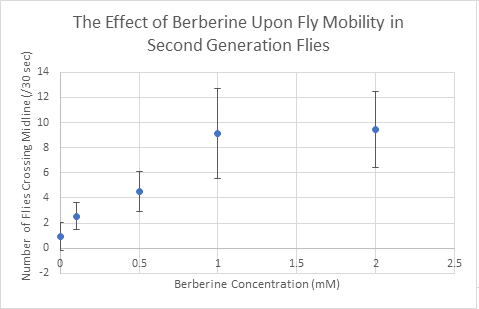Abstract
Berberine was tested upon Drosophila induced with depression. Flies were exposed to varying concentrations of berberine (.1, .5, 1, 2 mM) for a week, shaken for 1 hour at 1500 rpm, and fly mobility assay run. A significant difference and positive correlation were found between amount of berberine and number of flies passing midpoint demonstrating that berberine reduced depression in the first- and second-generation flies (p value< .01; r value<.001).
Background
Over 260 million people are affected by depression worldwide. This project explores the impact of a natural substance, berberine, upon trauma induced in Drosophila melanogaster. Depression is on the rise due to COVID with many searching for answers to their own mental health battles. Previous research on berberine given to depressed rats, suggests that berberine might serve as a good alternative to current pharmacological antidepressants. Berberine is a natural substance that has been used for centuries for a variety of medicinal purposes. The research suggests that Drosophila could have depression induced upon them through application of heat or shaking. Therefore, as the concentration of berberine is increased, drosophila will experience less depression and quicker recovery of flight.
Experimental Design:
Part 1: To induce depression, flies were placed into covered test tubes, shaken at 1500 rpm for 5 hours, flies performed a 30 second flying assay, and those that crossed midline were counted. This was repeated for 1 hour and for 30 seconds to determine optimum time.
Part 2: Unshaken flies were placed in flying tube, given 30 seconds and flies that crossed midline were counted. This was repeated two more times and then done with shaken flies.
Part 3: 4 vials each of 0, .1, .5, 1, and 2 mM berberine concentrations were created and 15 flies placed in each. Flies were given a week to mate, adults were taken out at that point and shaken and flying assay was performed. Another week was given for second generation to emerge and then they were shaken and flown.
Conclusion/Discussion:
For Part 1, it was determined that shaking the flies for one hour at 1500 rpm was best to induce depression. There was a statistically significant difference between the flies that were not shaken and those that were shaken in their flying assay.
For Part 2, the first-generation flies that were exposed to (.1, .5, 1, and 2 mM) demonstrated that as the concentration of berberine increased, there was a statistically significant increase in the number of flies that crossed the midpoint (p value < .01). A correlation coefficient was also calculated, and it was found that there was a significant positive correlation with critical value less than .01. It has been noted that when comparing the 1 to 2 mM there does not seem to be a significant difference which might suggest that 1 mM is the optimum amount that the flies need to be exposed to achieve benefits.
For Part 3, comparing the second-generation flies, it was found that there was a statistically significant relationship between the amount of berberine given and the number of flies that crossed the midpoint except for 1 to 2 mM (p value< .001). There was also a significant positive correlation was found that as the berberine increased so did the number of flies crossing midline (r <.01).
References/Acknowledgements:
Depression. (n.d.). Retrieved November 06, 2020, from https://www.who.int/news-room/fact-sheets/detail/depression
Fan, J., Zhang, K., Jin, Y., Li, B., Gao, S., Zhu, J., & Cui, R. (2019, January). Pharmacological effects of berberine on mood disorders. Retrieved November 06, 2020, from https://www.ncbi.nlm.nih.gov/pmc/articles/PMC6307759/
Lee, B., Sur, B., Yeom, M., Shim, I., Lee, H., & Hahm, D. (2012, December). Effect of berberine on depression- and anxiety-like behaviors and activation of the noradrenergic system induced by development of morphine dependence in rats. Retrieved November 06, 2020, from https://www.ncbi.nlm.nih.gov/pmc/articles/PMC3526741/
Ries, A., Hermanns, T., Poeck, B., & Strauss, R. (2017, June 6). Serotonin modulates a depression-like state in Drosophila responsive to lithium treatment. Retrieved November 06, 2020, from https://www.ncbi.nlm.nih.gov/pmc/articles/PMC5467214/







